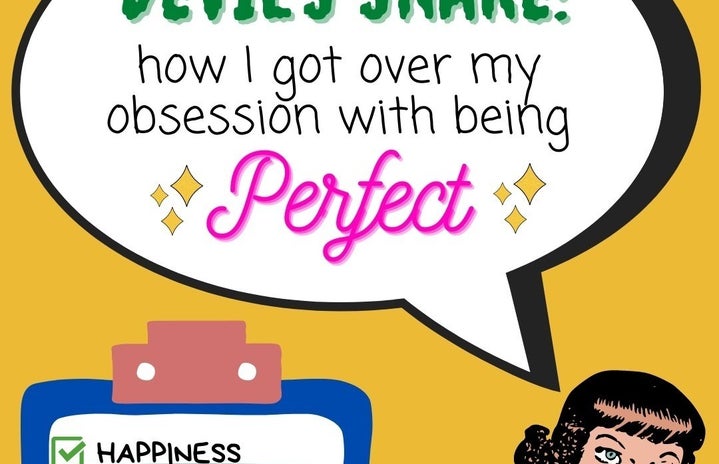Edited by Arnav Diwan
I’ve always been obsessed with doing things the right way. I wanted to be perfect. I couldn’t play a board-game without painstakingly going through all the instructions. I had to read the microwave user manual in its entirety before I dared to plug it in.
“If I never make a mistake, then maybe I’ll never have any regrets,” I’d always think. I wouldn’t ever have to write a pleading email to a professor asking for an extension, or ever say the words “I’m sorry,” (unless I bumped someone in the street, in which case I imagined myself making a graceful curtsey). At night, I lie in bed and imagine what an extraordinary creature I would be if I could just manage to do everything right all the time. Everyone would love me, wouldn’t they? If only I was perfect.
Maybe people quit the things they love because they think they’ll never be talented enough to succeed at them. I wouldn’t go back to dance class because I was afraid to see all my friends so far ahead of me. I hadn’t played sports in a decade, because there was a time in fifth grade when I was the last person to be picked for some utterly insignificant throwball team. However ridiculous it may have been, I was hurt. I was the sorest of all sore losers.
As an adult (albeit a young one, reading this you’d think I was fifty), I would try to eat healthier, but then the moment I ate something the slightest bit unhealthy, I’d think “What the hell, I might as well quit and eat whatever,” (I don’t think this little thing is that uncommon). This principle extended even to my work ethic. I worked (and still do) in fits of feverish inspiration. Some days, I would do more than a week’s worth of studying and for months on end, I’d do little to nothing. It made me miserable.
Wanting to be perfect seems like a positive thing. But holding onto perfection is like trying to grasp an eel through buttery fingers–utterly futile. I realized that something had to change.
A year ago, as I crossed the threshold of university, I made a choice. I decided to let myself be horrible at anything I wanted to do. It has never been my job to decide whether I am good at something or not. So I gave myself permission to go ahead and try everything I have had the remotest interest in. This process has proved agonising. I have failed more often than I have succeeded. I would apply to an internship and not hear back, or try to join a club only to find out that they wouldn’t accept me.
But even when I have had the hardest time, what has surprised me are the doors that open when I dared to give them a gentle push. I have made new friends; got better at communicating with people and no longer feel as if I was inferior. Of course, progress never happens linearly. There have been moments where I thought I had humiliated myself. I still replay situations and conversations in my head almost just as much as I used to before. But every time I do, I catch myself, “There. It wasn’t that bad. Maybe nobody noticed. Don’t overthink it.”
I tried out things that I had never even thought of doing before. We have all been programmed to have unrealistic expectations of ourselves–the ‘perfect’ body, the most fulfilling job, a hundred thousand awards and recognitions. Letting myself be imperfect is the most liberating thing I have ever experienced.
Before, I would procrastinate and not submit an assignment because I felt as if I could never write something that would pass the benchmark I had set in my fantasies. But now, I see value in the act of trying itself. The moment I try; I win. The pressure is lifted. I am free.
Is this some monumental new idea? Have I just stumbled upon the secret to all existence?
Of course not. It’s almost obvious to most people that “you don’t have to be the best at everything you do” (a cheesier way to put it would be “participating is more important than winning,” but that phrase is such a turn-off). A common assumption is that competition is healthy and motivates people to try harder and be better at whatever they’re doing. But to someone like me, competition was a source of dread. Failing at anything, even something I loved, tainted it for me in a way that made me stop enjoying it any more. Now my battle is to continue doing something that brings me joy, even if I was terrified of making a fool of myself.
But no principle is perfect. Taking on more things than I can handle has taken me close to the point of burning out. The new source of stress is keeping up with everything I have signed up for and truly trying my very best. I found ways to deal with this new problem. I took one thing at a time, delegated, and refused opportunities that seemed less valuable.
There’s a scene at the end of Harry Potter and the Philosopher’s Stone, where the three protagonists get caught in a web of Devil’s snare. The magical plant’s snake-like tendrils twist and immobilitate them. The more they struggle and thrash about, the stronger its vice-like grip becomes. My expectations were my own personal Devil’s snare.
So is everything perfect now that I don’t bother about perfection? Of course not. It never was, never will be. This whole rant would have been pointless if I said everything was perfect now. I’m still learning to accept that, of course, as we all are. But I’m better than I used to be and that’s finally enough for me. I am enough.



